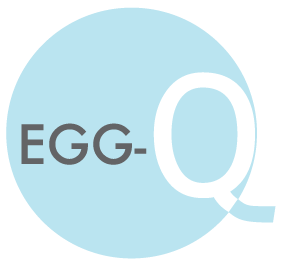PCOS affects 10% of women, causing weight gain, irregular periods, acne and infertility. Egg-Q tests for AMH levels, which can be an indicator of PCOS. Learn more about the signs, symptoms and treatments for PCOS during September, which is PCOS Awareness Month.
The easiest fertility check up: ask your mom!
Do you know at what age your mom reached menopause? Your aunt or grandmother? It's not something most women talk about. But this is the easiest, least expensive and least invasive fertility check up you can give yourself. Doesn't cost a dime or a drop of blood or even require two minutes spent in those dreaded stirrups.
The average woman reaches menopause (stops getting her period) in her early 50s. Anywhere between 45 and 55 years old is considered "normal".
But a woman's fertility drops dramatically during peri-menopause, which generally starts about 8 years before. So it is important to know if you may have a genetic tendency to reach menopause a bit younger than average.
What else can cause a woman to reach menopause early or lose her ovarian reserve younger than you would expect? Some causes can be reversed - such as smoking while taking the pill or being very overweight or very underweight. Some causes cannot be undone- such as having surgery to remove your ovaries, receiving certain cancer treatments, or as mentioned above, your genetics!
So this mother's day, ask your mom or aunt or grandmother how old she was at menopause. It is one of the most important questions we ask in our Egg-Q Fertility Check Up. And it is a key point you should bring up to your Ob-Gyn if your mom's answer is younger than 50 and you are planning on waiting and having your children a little later in life.
"But their ovaries suck!"
Watching "Biological Clock", part 3 of Lisa Ling's This is Birth series. Right at the start, one woman remembers her fertility doctor telling her, "We see so many women who look great, they look young, but their ovaries suck!" Cue the shock and horror on the faces of the other women in the segment.
Well, I was pretty horrified too. It's definitely not OK to talk to your patients in such a crass and cold way. But what he is saying is sadly true.
I live in Miami, where somehow pretty much everyone looks amazing. Botox? Plastic surgery? Brazilian genes? Endless hours at Equinox? I have no idea, but they do. Somehow 40 year-olds look like they are 25. But unfortunately your ovaries really don't care how amazing your body looks, how toned your arms are, or how wrinkle-free your forehead is. Inside, we are all pretty much the same. Starting at 27, and accelerating dramatically at 35, our ovaries begin to. . . well, suck. Your very smart body uses up its best eggs first. So at 20 most women release a "good egg" almost every month. By 35 maybe its only 4 - 6 months of the year. And by 40, we know that your chances of genetic abnormalities and miscarriage are greater every month than your chances of actually having a healthy baby.
So what can we do?
Well, first I am on a mission to let women know that their ovaries do in fact age very quickly in their 30s- in a nicer way than the tactless doctor did. Even my super smart, super successful friends still don't fully get this.
Second, Egg-Q is offering women an easy way to get a fertility check-up. We combine an AMH blood test with a questionnaire developed by the best fertility doctors (our partners at Conceptions Florida) and review it via a quick and easy tele-medicine consult. It's the best way to know if your ovaries are. . . how shall we say this. . . slightly sucky.
Finally, we actually have "botox for ovaries": it's called egg freezing. You put your eggs on ice and when you are ready to use them, they are fresh and young. Take a look at Lisa Ling's very real talk about the pros and cons. It's definitely worth your time if you want to learn more about egg freezing.
http://money.cnn.com/video/news/economy/2016/09/16/this-is-birth-biological-clock.cnnmoney/


